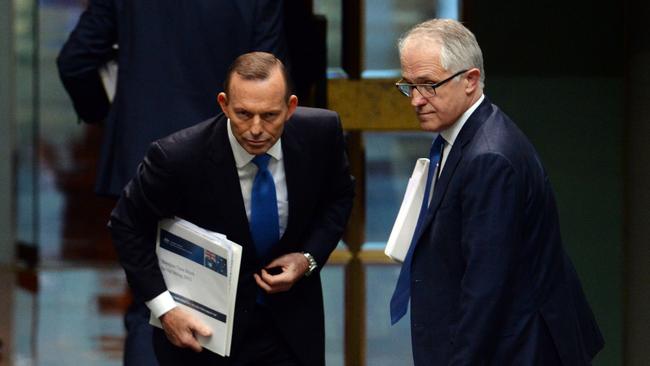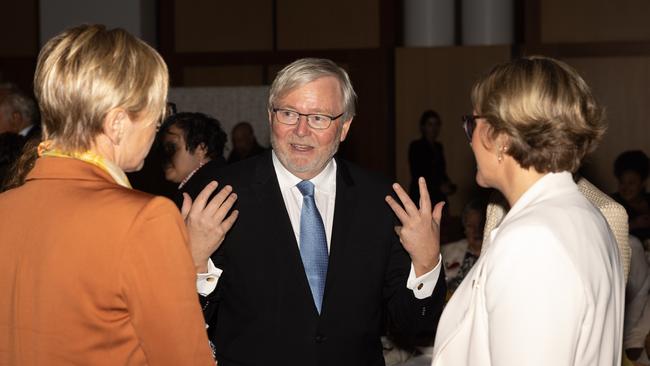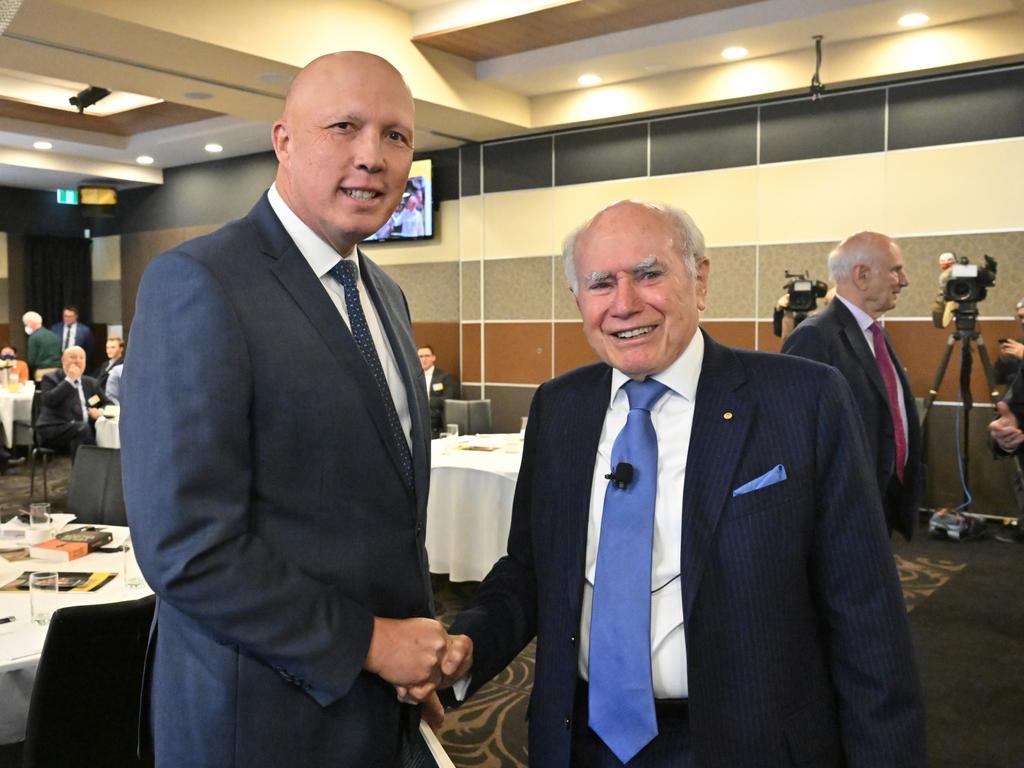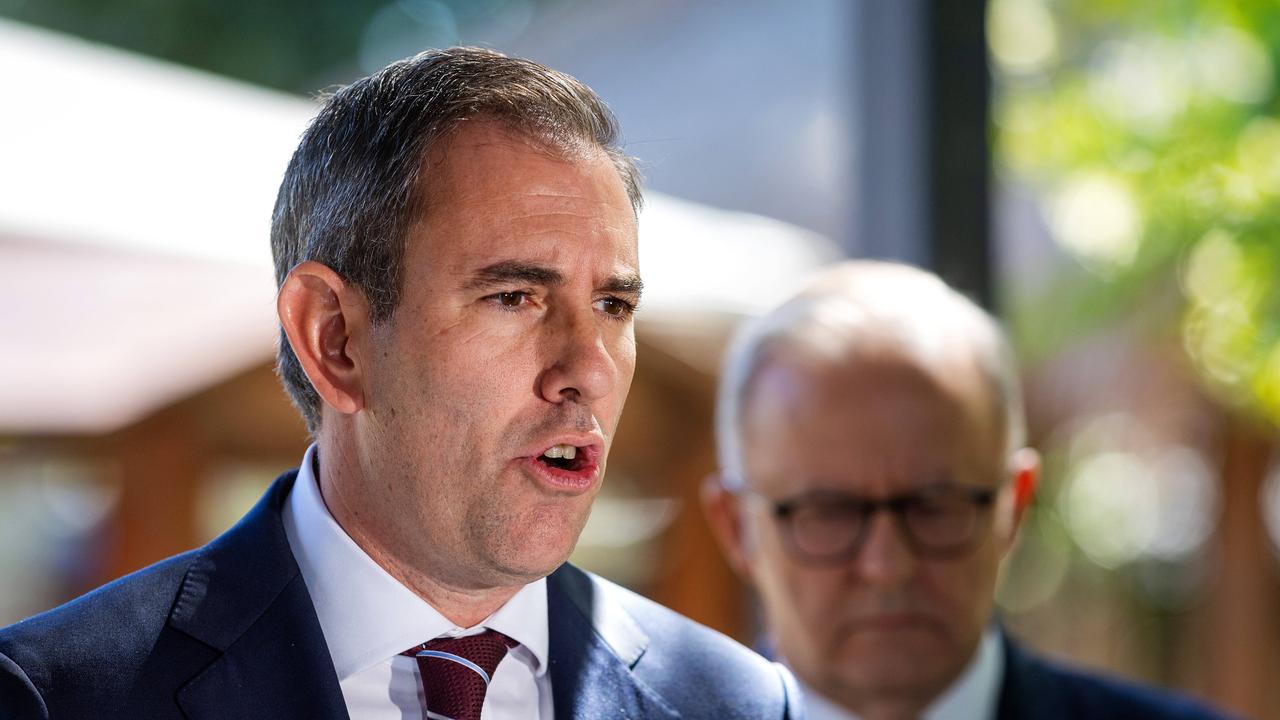
For political parties that want to win, the most important challenge is learning the right lessons from defeat, informed by empirical fact and not the self-serving fiction usually promulgated by those who scorn conservatives.
The push for Liberals to junk their previous electoral-winning formula to ape the left doesn’t really accord with the best research into what voters think.
In any event, this is the antithesis of the policy leadership people should expect from a credible political party.
It’s far from clear that the electoral centre of gravity really is moving left. And even if it is, that could just as easily be a product of weak leadership from the right as much as any inexorable force that political parties in a democracy would be foolish to resist.
Naturally, none of this has yet dawned on Malcolm Turnbull, who last week used an entire Robert Menzies Institute podcast (disclosure, I am a director of the RMI) to attack the party that made him prime minister.
Along with much else, Turnbull claimed the Liberal Party could “more or less cease to exist in the next five or six years” because most people on the “conservative side of politics … wouldn’t know the difference between Edmund Burke and Tony Burke”. He reckoned the “most significant thing to happen” at last year’s election was the success of the teals who, he said, were “all small-L liberals”. According to Turnbull, “regrettably, a lot of people supporting the Liberal Party … are living in a right-wing silo … and we’re seeing the consequences of that at the ballot box … I mean, you look in Victoria …”
Only someone removed by his own colleagues – not once but twice, essentially for repeat attempts to get the Liberals to adopt Labor’s energy policy – could think the Victorian opposition lost last year’s election for being “too right-wing” given it backed in Labor’s treaty push, gender ID laws and more.
In any event the authoritative Australian Election Study, which the Australian National University’s school of politics has been producing since 1987, concluded “most teal voters were not ‘disaffected Liberals’ but tactical Labor and Greens voters” because “less than one in five teal voters previously voted for the Coalition”.
According to the ANU study, “teal voters are almost the same as Labor voters in their ideological position” and they’d voted teal because they were “intent on unseating the incumbent Liberal”, only their preferred party (read Labor or the Greens) was “non-viable in the electorate”.
Among the small percentage of former Liberal voters who did turn teal, the Climate 200 campaign’s focus on emissions policy, political integrity and gender equality no doubt made a difference. Still, that’s not to say the Liberals should try to beat the teals at their own game (as Turnbull foolishly recommends) because of the wider electoral consequences of any shift to being Labor-lite.

Climate policy might have hurt them in the richer seats that turned teal but climate and the environment were not the most important election issue last year for 83 per cent of the overall electorate. Even taken together, climate and the environment were No.1 for only 17 per cent of the total electorate, down four percentage points from the 2019 election.
At 32 per cent, cost of living was by far the most important single issue at last year’s election and the Coalition’s key liability was that it had lost much of its traditional strength with voters as the best party to manage the economy.
In 2019, the Coalition had a 26-percentage-point advantage as the “preferred party on management of the economy” but that had shrunk to just 15 points three years later, with a seven-point increase in those who thought there was no difference between the parties.
As the preferred party on tax, the Coalition’s advantage had dropped from 27 (in 2019) to just four percentage points last year, with a huge 19-point leap in “no difference”.
And despite Scott Morrison’s conversion to the cause of net zero in 2021, Labor’s lead as the “preferred party policy on global warming” had shot from 18 to 30 points, meaning this capitulation hadn’t helped the Liberals one iota – indeed, it made things worse.
At last year’s federal election, only 53 per cent of voters rated policy issues as the key (down 13 percentage points since 2019) and only 28 per cent thought there was a “good deal of difference between parties” (down 12 points). Hence, a close reading of the ANU’s Australian Election Study results suggests the Coalition’s problem was much less comparative scepticism on climate than comparative ineptitude on the economy.
Apart from losing its edge on the economy, the Coalition’s biggest problem last year was leadership, with Morrison having the lowest rating in the history of the study. By contrast, in the 1998 GST election, while John Howard rated below Kim Beazley in all the polled leadership characteristics, the Coalition still fell over the line in an election where 68 per cent thought taxation was “extremely important” in their voting decision and voters thought government had had a positive effect on the country’s finances by a net 12 per cent.
But here’s what’s most telling when you dig into the detail. While the ANU study confirms that voters have become far less tribal across the past three decades, it’s the Labor Party that now has a consistently smaller share of rusted-on voters. In only one election since 1990 have more Coalition than Labor voters “considered changing (their) vote during (the) campaign”, and even now 16 per cent of voters are “lifetime … stable Liberal-National” compared with just 12 per cent for Labor.
And while voters earning more than $140,000 a year are now those least likely to vote Coalition and most likely to vote Labor or Greens (yes, that’s right), the percentage who identify as working-class Labor voters has dropped from 60 per cent to 38 per cent since 1987.
In fact, in the 2004 (Howard) and 2013 (Tony Abbott) elections, the same percentage of working-class people voted Coalition as Labor. Interestingly, these were both elections where there was thought to be a clear contrast between the parties, with the Coalition making a strong pitch on cost-of-living issues.
And sure, the Coalition might have a “women problem” with 32 per cent of the female vote last year and 38 per cent of men, yet somehow no one seems to think Labor has an almost equivalent “men problem” because it won just 32 per cent of men (and 36 per cent of women). It’s worth noting that the first time the Coalition’s female vote dropped below 40 per cent was under Turnbull in 2016; the relatively conservative Howard and Abbott did better here, notwithstanding the left’s spin.
The clear lesson from this long-term study is that the Coalition does best when it has a strong economic message pitched to aspirational voters. There’s little point trying to win back wealthy “progressive” voters with much the same policy mix as green Labor, especially as that would undermine the Coalition’s growing appeal to “struggle street”. The Coalition’s best chance to regain teal seats is when Labor is threatening the financial security of wealthy voters, and the only way to resist is to vote Liberal. As the economy faces more headwinds, that may come much sooner than anyone thinks – but only if the Liberals stay Liberal and don’t try to be Labor without the unions.







A couple of weeks ago I spoke at an event in Brisbane attended by more than 300 Liberal National Party supporters and discussed, among other things, the false narrative that the right must move to the left to be electorally successful.